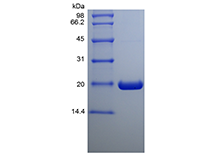Ubiquitin Conjugating Enzyme E2 C belongs to the ubiquitin-conjugating enzyme family and is encoded by the UBE2C gene in humans. The ubiquitin-conjugating enzymes, also known as E2 enzymes and more rarely as ubiquitin-carrier enzymes, take part in the second step in the ubiquitination reaction. In this reaction, E1 activates the ubiquitin by covalently attaching the molecule to its active site cysteine residue. The activated ubiquitin is then transferred to an E2 cysteine and then the E2 molecule binds E3 via a structurally conserved binding region. The UBE2C catalyzes the destruction of cyclins A and B in conjunction with the anaphase-promoting complex, and therefore, plays an important role in the control of the cell exit from mitosis. This activity is essential at the end of mitosis for the inactivation of their partner kinase Cdc2 and exit from mitosis into G1 of the next cell cycle. In addition, UBCH10 bears homology to yeast PAS2, a gene that is essential for biogenesis of peroxisomes. UBCH10 is useful for in vitro ubiquitinylation reactions.

